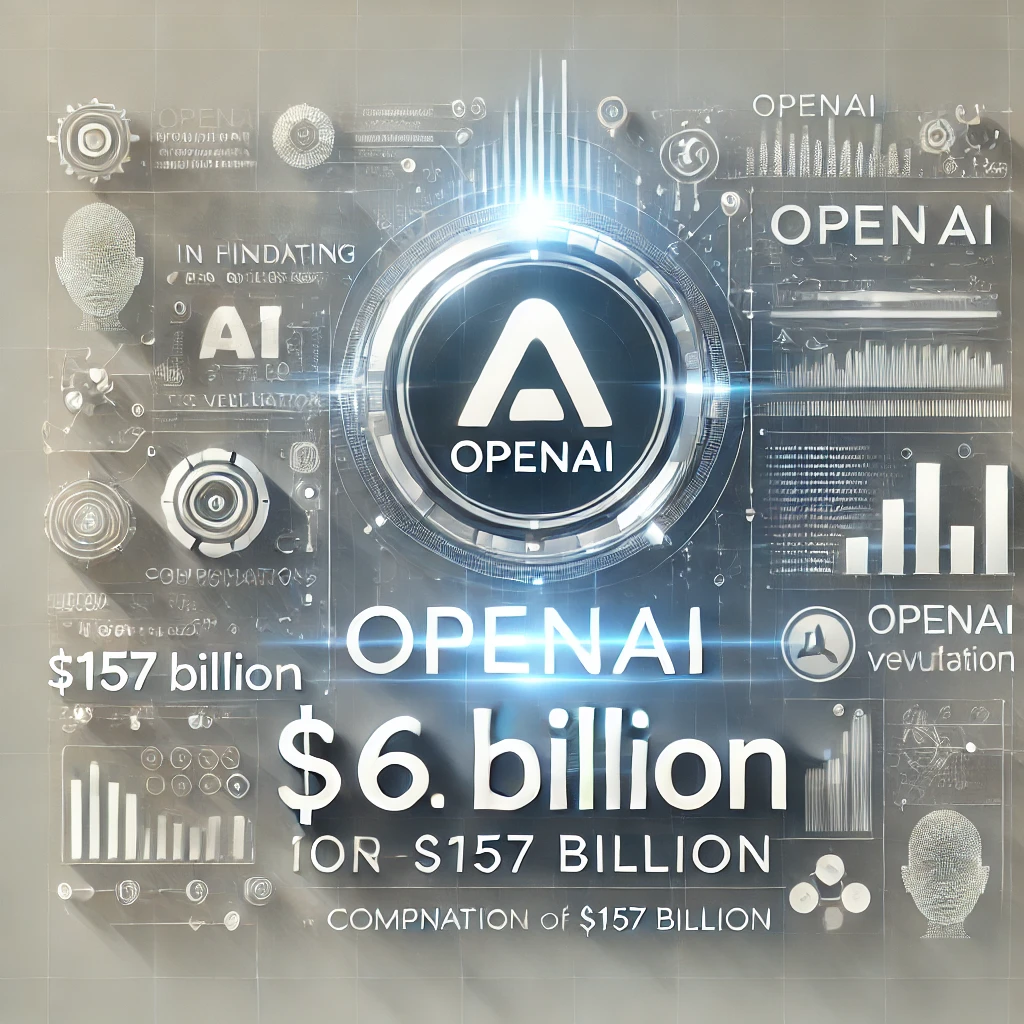OpenAI has successfully raised $6.6 billion in fresh funding, pushing the artificial intelligence company’s valuation to a staggering $157 billion. This new influx of capital will significantly boost its mission to develop the world’s foremost generative AI technology. Thrive Capital, led by Josh Kushner, played a leading role in the funding round, contributing $1.3 billion. Microsoft Corp., OpenAI’s largest financial supporter, added around $750 million to the pot, on top of the $13 billion it had previously invested. This information comes from a source close to the matter. Other major investors in the round included Khosla Ventures, Fidelity Management & Research Co., and Nvidia Corp., the chipmaking giant that plays a crucial role in powering AI advancements. Microsoft declined to comment on its participation.
The deal stands as one of the largest private investments in history, placing OpenAI among the top three largest venture-backed startups, alongside Elon Musk’s SpaceX and TikTok’s parent company, ByteDance Ltd. This massive investment reflects the tech industry’s strong faith in AI’s potential, despite the enormous costs involved in the research necessary for its ongoing development.
Other prominent contributors to the funding round were Tiger Global Management, which invested $350 million, and Altimeter Capital, which put in at least $250 million, according to insider reports. The round also saw participation from global backers such as SoftBank Group Corp. and MGX, a newly-formed tech investment firm based in Abu Dhabi. SoftBank’s contribution was around $500 million, according to a source who wished to remain anonymous due to the confidentiality of the information. Additionally, venture capital firm Coatue joined the round.
In a statement following the deal, OpenAI announced that the new funds would be used to further its research in AI and to scale up its computing capabilities. “AI is already reshaping education, driving medical breakthroughs, and enhancing productivity,” said OpenAI’s Chief Financial Officer Sarah Friar. “And this is just the beginning.”
The enormous valuation of OpenAI has captured the attention of Silicon Valley. Altimeter CEO Brad Gerstner, speaking at the Madrona IA Summit in Seattle, expressed the widespread amazement at the company’s $157 billion valuation, saying, “People are astonished at the $150 billion figure.” However, he pointed out that OpenAI is projected to generate more than $10 billion in revenue next year, which would make a valuation of ten times its projected earnings reasonable for a company on the cusp of going public. Gerstner suggested that an IPO might be the next logical step for OpenAI, describing it as “the most important AI company in the U.S., second only to Nvidia.”
Apple Inc., despite previously holding discussions about investing, did not participate in this funding round, according to reports from Bloomberg. Apple and OpenAI have an ongoing partnership, with OpenAI’s ChatGPT being integrated into Apple devices and the Siri voice assistant. There were also discussions about Apple obtaining a board observer seat at OpenAI, but those plans were ultimately dropped, according to insiders familiar with the negotiations.
A portion of the funds was raised through special purpose vehicles (SPVs), a financial mechanism allowing investors to pool resources to buy stakes in the company. For example, Thrive Capital not only invested its own funds but also organized an SPV to contribute additional capital, according to a person familiar with the deal. OpenAI declined to comment on the details of the SPVs involved.
This financing round follows a particularly turbulent period for OpenAI. In November of last year, the company’s board ousted CEO Sam Altman, only to reinstate him shortly after. In the months since, the company has undergone significant restructuring, including overhauling its board, bringing in hundreds of new employees, and witnessing the departures of key figures like co-founder Ilya Sutskever and former Chief Technology Officer Mira Murati.
OpenAI is also in the process of contemplating a transition from its current nonprofit model to a for-profit structure, a move that has been a point of contention for some investors. Although the shift would likely appease its financial backers, it could present legal and logistical challenges. Discussions have also taken place about potentially awarding equity to Altman, with his stake possibly exceeding $10 billion, although OpenAI’s board has not discussed any specific figures yet.
OpenAI initially drew widespread attention in Silicon Valley with the launch of its chatbot, ChatGPT, in 2022. The AI-powered chatbot can generate human-like responses and has gained significant traction, with the company reporting 250 million weekly active users. Its paid service, ChatGPT Plus, has around 11 million subscribers, while its business-focused offering has more than a million users, according to reports from Bloomberg.
Despite its dominance in the AI space, OpenAI faces growing competition. Several startups, founded by former OpenAI employees, are emerging as rivals, such as Anthropic and Safe Superintelligence. In addition, larger tech companies with immense resources, including Google and Amazon, are working on developing their own AI models, further intensifying the competition.
In this latest funding round, OpenAI urged investors not to back its competitors, such as Anthropic or xAI, Elon Musk’s AI startup. According to sources familiar with the discussions, leading venture capital firm Sequoia Capital, which had invested in Safe Superintelligence, opted not to participate in OpenAI’s fundraising efforts. Bloomberg had previously reported on this development.
With its groundbreaking technology and massive influx of capital, OpenAI continues to push the boundaries of AI research, positioning itself at the forefront of the industry. However, the company is not without challenges as it navigates intense competition, legal hurdles, and structural changes. As OpenAI moves forward, all eyes will remain on the developments that will shape the future of AI and its transformative impact on industries worldwide.


